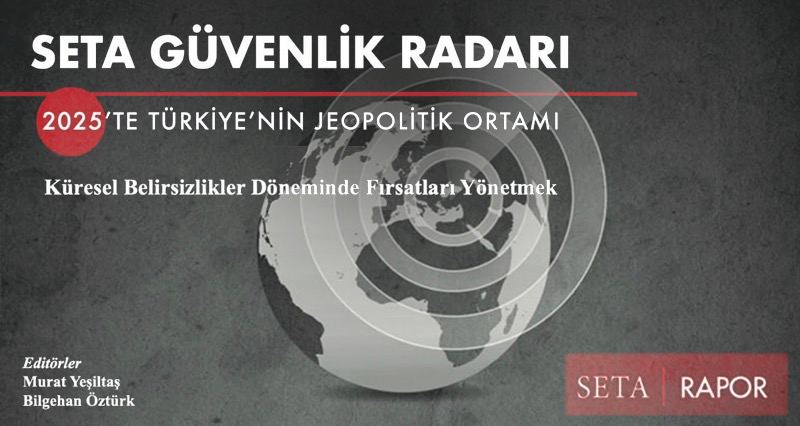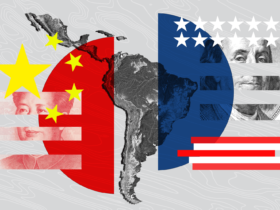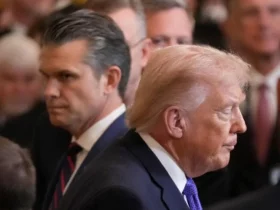The report forecasts a divergence of Türkiye’s relations with Russia and Iran.
The report forecasts a divergence of Türkiye’s relations with Russia and Iran.
The Foundation for Political, Economic and Social Research (SETA), known as a think tank close to the government in Türkiye, published its predictions for Türkiye’s foreign policy in 2025.
The report titled “SETA Security Radar: Türkiye’s Geopolitical Environment in 2025” included assessments on how global developments will be in Türkiye’s geopolitical environment in the new year. The “opportunities and risks” that developments in the US, NATO, the European Union (EU), Russia, Iran, Syria, Israel-Palestine, the South Caucasus, Africa and the Balkans will pose for Türkiye were analyzed.
The report, which argues that there will be a divergence in Türkiye’s relations with Russia and Iran in 2025, noted that strategic progress will be made in relations with the US/NATO and the EU.
It was noteworthy that the report did not include any assessments regarding Cyprus, the Eastern Mediterranean, the Aegean Sea and Greece.
The report highlighted the following:
‘Deterrence against Russia’s threats’
“In 2025, Türkiye’s relations with Russia will be shaped by a two-way approach that balances strategic cooperation with indirect restriction. While economic and energy relations are at the center of the bilateral agenda, Türkiye’s geopolitical priorities and NATO commitments necessitate cautious and pragmatic interaction with Moscow.
“Türkiye’s support for opposition forces and its fight against PKK/YPG elements are manifestations of its strategic divergences with Moscow, despite ongoing diplomatic coordination.
‘Türkiye is the cornerstone of NATO’
“Türkiye continues to be the cornerstone of NATO’s southeastern flank, playing a vital role in deterring threats from Russia and stabilizing the Middle East.
“Türkiye actively supports NATO in adapting to emerging challenges such as cyber threats, climate-related security risks and maritime security in the Black Sea. Its establishment of the Black Sea Mine Countermeasures Task Force (MCM Black Sea) with NATO allies, such as Romania and Bulgaria demonstrate Türkiye’s commitment to regional security and crisis management.
‘Conflict with Israel may emerge’
“Syria may emerge as a region where conflicts of interest may arise between Türkiye and Israel.
“In an environment where Türkiye prioritizes Syria’s territorial integrity and the fight against terrorism, regional tensions may increase as Israel may pursue strategies that challenge Türkiye’s efforts to stabilize Syria.
‘Conflictive competition with Iran’
“The collapse of the Assad regime and Iran’s weakened position have presented opportunities for Türkiye to balance Iranian influence in Syria and the wider region. However, Iran’s withdrawal from Syria and the decline of its influence could lead Iran to support asymmetric elements against Türkiye in Syria, which could trigger a conflictive competition between Ankara and Tehran.
“In addition to competition with global powers such as China, France and Russia, Türkiye also faces challenges such as political instability and terrorism risks in some regions.
‘Speculation of turning to Russian alternatives’
“Building on the progress made in 2024, Türkiye will continue to modernize its Air Force with 4.5 generation fighter jets such as the F-16 and possibly the Eurofighter Typhoon, indicating a preference for NATO-standard platforms, which despite previous speculations about a possible turn to Russian alternatives, shows that NATO compliance is a priority.
“While Türkiye continues its commitments to NATO, it also emphasizes its efforts to strengthen its partnerships with Africa and Central Asia, as well as its search for strategic autonomy.
‘Accusation of axis shift’
“Emerging ‘new’ threats will force NATO to transform itself to adapt to the requirements of future conflicts and tensions. Türkiye will continue to be committed to NATO’s vision, goals and objectives, despite accusations of ‘axis shift’ by malicious individuals and institutions.
“In 2024, unlike last year’s conjuncture, the Kremlin’s main concern is the possibility of Türkiye joining Western sanctions against Russia. Moscow believes that such a step would narrow its trade-oriented transaction options and completely alienate Ankara from Moscow. This alleged concern was reflected in bilateral talks between leaders and ministers.
Türkiye is reducing Russia’s power
“Although Türkiye’s steps do not directly and intentionally aim to limit Russia’s influence and material capabilities, they are leading to a significant reduction in these indicators. Therefore, Türkiye’s interaction with Syria and, to some extent, Ukraine seems to have had such a result on Moscow’s influence. Despite the volume of economic relations worth approximately $56 billion and the power asymmetry between them, Ankara’s steps are narrowing Moscow’s power projection.”
Proposal to exclude regional countries in Syria
“One of Türkiye’s strategic priorities in 2025 will be to focus on the YPG issue. Türkiye’s priorities for solving the YPG issue can be listed as follows: disarmament of the YPG, separation of PKK elements within the YPG, and separation of foreign fighters within the YPG.
“The regional power vacuum created by Russia’s decreasing influence and Iran’s weakening position offers Türkiye an opportunity to shape a new regional politics.
“If the Trump administration does not take steps to limit the Netanyahu government, taking measures against Israeli policies that threaten both the stability of the region and Türkiye’s national security will be among Ankara’s main priorities in 2025.
“There are three main dynamics in the conflict between the West and Iran: Iran’s nuclear program, its missile program, and Iran-backed militias.
‘Cautious and warned foreign policy with Iran’
“Türkiye has adopted a cautious foreign policy; while displaying a clear stance on Iran’s nuclear program and the sanctions imposed due to this program, it has tried to stay out of the other two issues as much as possible.
“The Baath regime has distanced itself from Türkiye and turned the country into an area for Iran’s military and political maneuvers.
“These militias have also occasionally engaged in activities against Türkiye.
‘The attitude towards Iran’s nuclear program will not change’
“The Zangezur Corridor has been another important issue where Türkiye and Iran, as two regional powers, have come face to face.
“Türkiye has always had a clear position on Iran’s nuclear program. Accordingly, on the one hand, Türkiye has emphasized that Iran’s nuclear program should be used for peaceful purposes, and on the other hand, it has opposed discrimination against Iran on this issue.
“Iran opposes the Zangezur Corridor because it believes that its natural borders will change and its connection with the Caucasus will be cut off. On the other hand, Iran does not like the fact that the corridor will bypass Iran and directly connect Türkiye to the Turkic Republics.
“It attaches great importance to platforms such as the 3+3 negotiation format. However, whether such proposals will be accepted by the other parties is a question mark.
“Türkiye’s stance on Iran’s nuclear program will not change. Türkiye defends the view that military intervention is not a solution, not only for nuclear programs that do not have peaceful purposes. It is also against the implementation of measures stemming from such programs only on Iran. In addition, Türkiye does not approve of sanctions against Iran and defends the view that military intervention is not a solution.”
“Türkiye can reach an agreement with the US on the PYD issue”
The Turkish-American relations section of the report stated that an “acceptable compromise” environment could be established with the US on the PYD issue in Syria. The “cooperation-based solution” scenario to be made with the US was expressed as follows:
“In this scenario, Türkiye and the US could reach a mutually acceptable compromise on the PYD issue. In this case, the US could accept Türkiye’s security concerns and limit its military and political support to the PYD, while Türkiye could avoid large-scale military operations in northeastern Syria. Instead, both countries could cooperate on a framework that aims to ensure the stability of the region. This approach could ensure the security of the region, while Türkiye could accept the PYD’s declaration that it had severed its ties with the PKK, allowing it to position the PYD as a non-military actor in the political reconstruction of Syria in the new period.
“Such a scenario could diversify the opportunities for cooperation between Türkiye and the US. “By using Türkiye’s regional influence and the US’s intelligence capabilities, the fight against ISIS can continue uninterrupted and security risks can be minimized through the coordination of security mechanisms between the two countries. In this way, a cooperation-based approach can strengthen Turkish-American relations and open the door to broader cooperation on Syria’s stability and other strategic issues.”
“Dependency on Russia should be reduced”
The SETA report also includes suggestions that are more advanced than Ankara’s balancing policy. It is argued that energy dependency on Russia prevents free decision-making. The report describes Ukraine, which the US and NATO have been dragging into war to surround Russia, as a ‘strategic partner’:
“Ukraine means the following four things to Türkiye:
• A strategic ally with whom it has deep cooperation in the defense industry,
• A stakeholder in Black Sea security and Türkiye’s maritime neighbor,
• A balancing-limiting actor against Russia,
• Homeland of the ethnic Turkish Tatar population,
“Kiev is also in an extremely critical position in terms of the security of the Black Sea and the balancing of Russia in military, political and religious terms. In addition, Türkiye attaches great importance to the rights and well-being of the Crimean Tatars and does not intend to back down from its stance on this issue.
“As a NATO member country, Türkiye sees Ukraine as a strategic partner with whom it has close military and defense industry ties, and this poses a threat to Moscow.
“Türkiye’s perception of Ukraine as an actor that limits Russia is also not viewed positively in Moscow.
“The preferred outcome in the long term is to reduce dependence on Russian natural resources. In such a case, Ankara will be able to make decisions much more freely vis-à-vis Moscow.
“The use of force, including nuclear weapons, will be considered an action that will require retaliation against all parties, including Ukraine and NATO, in this scenario. This situation naturally makes a conflict between the two parties possible. Türkiye, as a NATO member country, will be affected by this possibility and may face the risk of becoming a party to the war despite preferring to remain neutral.”

















Leave a Reply